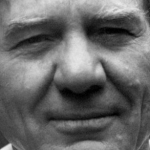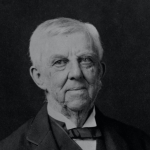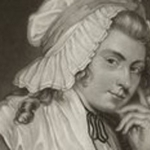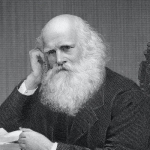When first I walked here I hobbled
along ties set too close together
for a boy to step easily on each.
I thought my stride one day
would reach every other and from then on
I would walk in time with the way
toward that Lobachevskian haze
up ahead where the two rails meet.
Here we put down our pennies, dark,
on shined steel; they trembled, fell still;
then the locomotive out of Attleboro
rattling its berserk wheel-rods into perfect circles,
brightened them into wafers, the way a fork
mashes into view the inner light of a carrot
in a stew. In this late March sunshine,
crossing the trees at the angle of a bow
when it effleurages out of the chanterelle
the C three octaves above middle C,
the vertical birthwood remembers
its ascent lines, shrunken by half, exactly
back down, each tree on its fallen summer.
Back then, these rocks often asked
blood offerings—but this one, once, asked bone,
the time Billy Wallace tripped and broke out
his front teeth. Fitted with gold replicas,
he asked, speaking more brightly, “What good
are golden teeth, given what we’ve got
to eat?” Nebuchadnezzar
spent seven years down on all fours
eating vetch and alfalfa, ruminating
the mouth-feel of “bloom” and “wither,”
until he was whole. If you
held a grass blade between both thumbs
and blew hard you could blurt a shriek
out of it—like that beseeching leaves oaks
didn’t drop last winter just now scratch
on a breeze. Maybe Billy, lured
by bones’ memory, comes back
sometimes, too, to the Seekonk Woods,
to stand in the past and just look at it.
Here he might kneel, studying this clump of grass,
as a god might inspect the strands of a human sneeze
that percusses through. Or he might stray
into the now untrafficked whistling-lanes
of the mourning doves, who used to call and call
into the future, and give a start, as though,
this very minute, by awful coincidence,
they reach it. And at last traipse off
down the tracks, with arrhythmic gait,
as wanderers must do once they realize:
the over-the-unknown route, too, ends up
where time wants. On this spot
I skinned the muskrat. The musk breezed away.
I buried the rat. Of the fur
I made a hat, which as soon as put on
began to rot off, causing my scalp to crawl.
In circles, of course, keeping to the skull.
One day could this scrap of damp skin
crawl all the way off, and the whole organism
follow? To do what? Effuse with musk,
or rot with rat? When, a quarter-
turn after the sun, the half-moon,
too, goes down and we find ourselves
in the night's night, then somewhere
hereabouts in the dark must be death.
Knowledge of it beforehand is surely among
existence’s most spectacular feats—and yet right here,
on this ordinary afternoon, in these woods,
with a name meaning “black goose” in Wampanoag,
or in modern Seekonkese, “slob blowing fat nose,”
this unlikely event happens—a creature
walking the tracks knows it will come.
Then too long to touch every tie, his stride
is now just too short to reach every other,
and so he is to be still the wanderer, the hirtle
of too much replaced by the common limp
of too little. But he almost got there.
Almost stepped in consonance with the liturgical,
sleeping gods’ snores you can hear humming up
from former times inside the ties. He almost
set foot in that border zone where what follows
blows back, shimmering everything, making
walking like sleepwalking, railroad tracks
a country lane on a spring morning,
on which a man, limping but blissful,
makes his way homeward, his lips, suppled
by kissing to bunch up like that, blowing
these short strands of hollowed-out air,
haunted by future, into a tune on the tracks.
I think I’m about to be shocked awake.
As I was in childhood, when I battered myself
back to my senses against a closed door,
or woke up hanging out of an upstairs window.
Somnambulism was my attempt to slip
under cover of nightmare across no father’s land
and embrace a phantasm. If only
I had found a way to enter his hard time
served at labor by day, by night in solitary,
and put my arms around him in reality,
I might not now be remaking him
in memory still; anti-alchemizing bass kettle’s
golden reverberations back down
to hair, flesh, blood, bone, the base metals.
I want to crawl face down in the fields
and graze on the wild strawberries, my clothes
stained pink, even for seven years
if I must, if they exist. I want to lie out
on my back under the thousand stars and think
my way up among them, through them,
and a little distance past them, and attain
a moment of absolute ignorance,
if I can, if human mentality lets us.
I have always intended to live forever;
but not until now, to live now. The moment
I have done one or the other, I here swear,
no one will have to drag me , I’ll come
but never will I agree to burn my words.
The poplar logs creosoted asleep under the tracks
have stopped snoring. Maybe they’ve
already waked up. The bow saws at G.
An oak leaf rattles on its tree. The rails
may never meet, O fellow Euclideans,
for you, for me. So what if we groan.
That’s our noise. laughter is our stuttering
in a language we can’t speak yet. Behind,
the world made of wishes goes dark. Ahead,
if not now then never, shines what is.
















Comment form: